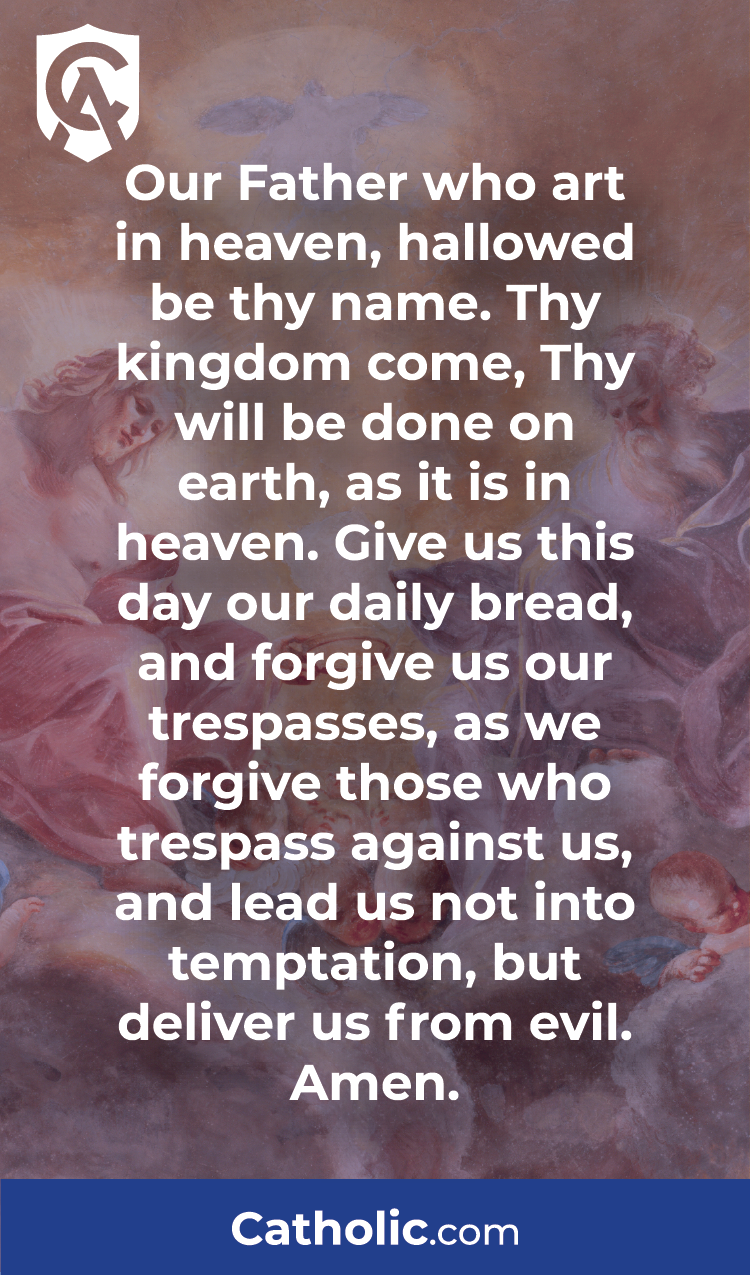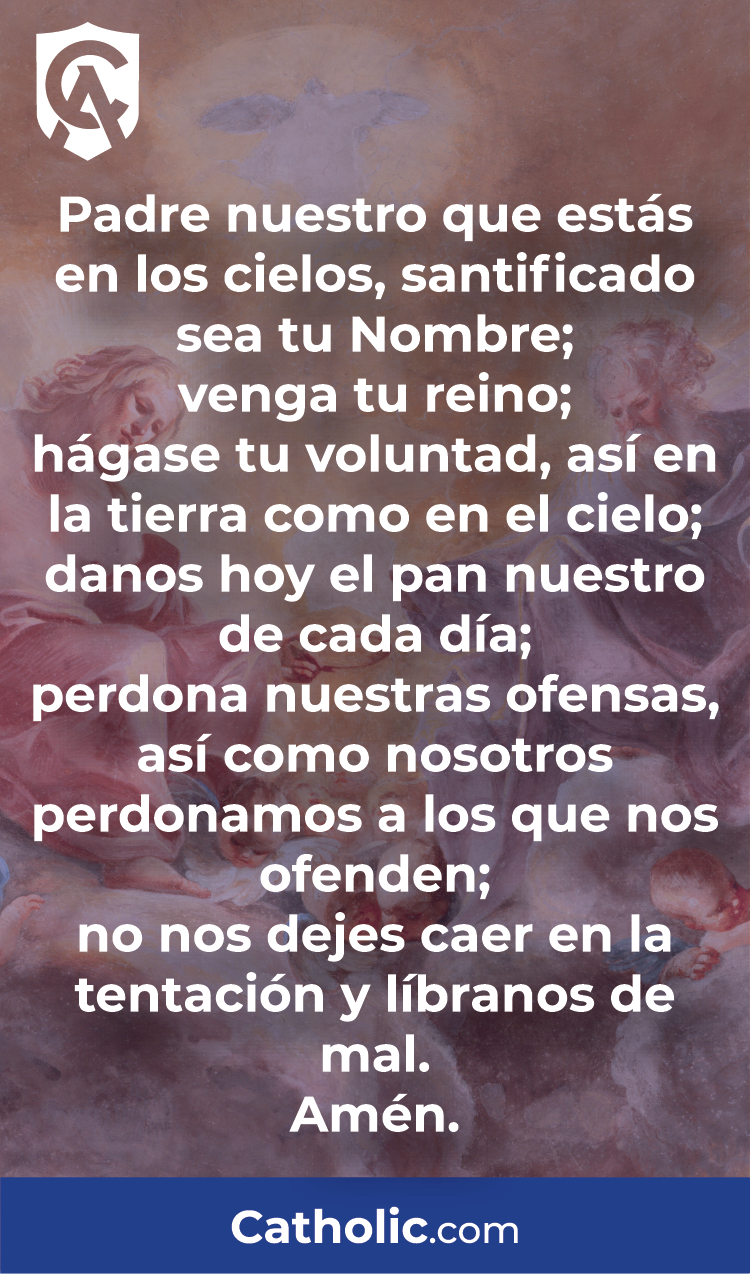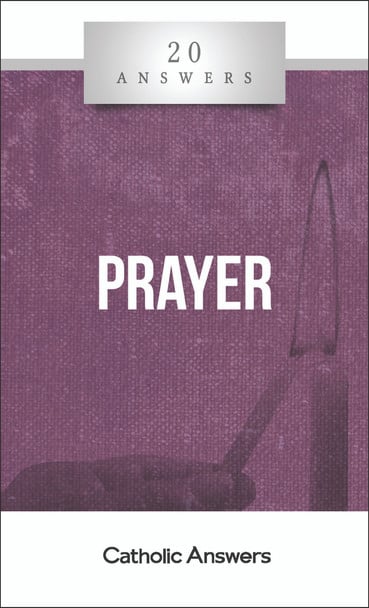
What Is the Our Father Prayer?
Our Father who art in heaven,
hallowed be thy name.
Thy kingdom come,
Thy will be done
on earth, as it is in heaven.
Give us this day our daily bread,
and forgive us our trespasses,
as we forgive those who trespass against us,
and lead us not into temptation,
but deliver us from evil.
Amen.
“Lord, teach us to pray.” This is what the Savior’s disciples asked him. Of course, any answer coming from him would be a perfect answer. His answer was what we call the “Our Father” or the “Lord’s Prayer.” This prayer is a perfect model of how we should pray and for what things we should pray, and in what order. The “Our Father” is also included in many devotional prayers, like the Rosary and Divine Mercy Chaplet.
Free Download | Our Father Prayer Card in English
Free Download | Our Father Prayer Card in Spanish
How to Pray the Our Father
The Lord really did answer the apostles’ request to teach them how to pray. The Our Father teaches us the goal of prayer, the means of prayer, and the obstacles to be overcome. Glory be to him for, as we conclude this prayer at holy Mass, his is the kingdom and the power and the glory forever!
Free eBook Download | 20 Answers: Prayer
What Is Prayer?
Prayer is a unique grace from God, which allows us to set our mind on the Divine. The act of prayer is a virtue of religion, and is a great benefit to us. Through prayer, we elevate our hearts and minds to the knowledge of God. Ultimately, prayer is a mysterious gift that our Lord has bestowed upon us. In Matthew 6:9 Jesus says “Pray then like this.” Approaching prayer, especially the Our Father, conversationally is a good exercise.
What Does the Our Father Prayer Mean?
First off, this prayer teaches us that we should desire the glory and honor of God as the first intention of our prayer, no matter what we may be praying for. Thus, we pray that God’s name be honored and held holy. Then we pray that his will be done as perfectly among us on earth as his angels accomplish it in his heavenly kingdom. There would be no point in praying unless we wanted God’s will to be done. Nothing would be ultimately helpful to us if it were against his will, even if it is what we wanted.
Then, after these universal intentions—for God’s glory and for his will—we pray for the things we need in order to glorify him and be united to him. “Our daily bread” means all that we need to serve him here and now: first of all, his supernatural gift of his Body in the Holy Eucharist, and then the necessities of life we need each day.
Thus far, the prayer is all about positive things: God’s glory and his gifts to us. But there are also obstacles to his glory and his gifts. These are our sins and other people’s sins against us. We need God’s forgiveness for our ungratefulness in sinning, especially when we are in the act of asking him for good things, and of course we have to be willing to forgive others if we ourselves want to be forgiven.
Where Is the Lord’s Prayer in the Bible?
The Lord’s Prayer was given to us in the book of Matthew 6:9-13, and again in Luke 11:2-4. The version used by a majority of the faithful is the version outlined in the Bible in Matthew’s Gospel.
Willing to forgive others? This is the hardest petition of the Lord’s Prayer, the one we struggle with the most. It is so important that it is the only part of the prayer given in St. Mark’s Gospel. If we can forgive those who have hurt us, we will receive what we ask from God, because we will be acting like him and pleasing him. God loves a forgiving heart more than anything.
But there is not only sin, there is also the struggle against sin we have to endure when we are tempted. Here we are in complete need of help and grace, even though we realize that it’s for our good that we need to struggle in order to be faithful to God. He will be faithful to us as well in time of trial
The last negative: there is the devil, our spiritual enemy who constantly tries to remove us from God’s glory, his holiness, his kingdom, his Eucharist, his pardon, and his help. Although the English and Latin versions of the Our Father pray simply for us to be delivered from “evil,” the Greek original clearly prays for us to be delivered from the “Evil One.” Thus, our most common prayer taught us by the Lord himself contains a little exorcism against the devil.
Related Content
Q & As
If Jesus Condemned Repeated Prayers Why Do You Pray the Lord’s Prayer?
Articles
Why do Christians say the Our Father (the “Lord’s Prayer”) slightly differently?
What Difference Does Prayer Make?
Books
Praying to Our Lord Jesus Christ: Prayers and Meditations Through the Centuries





